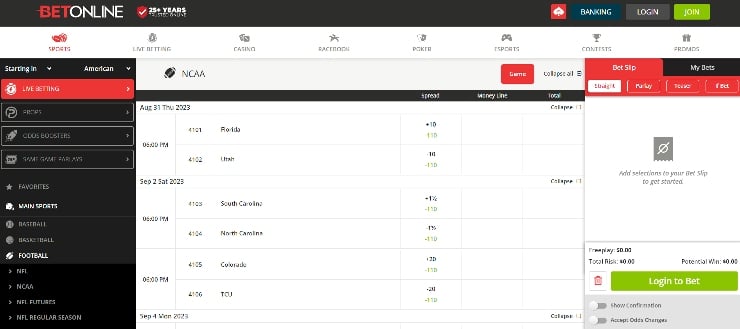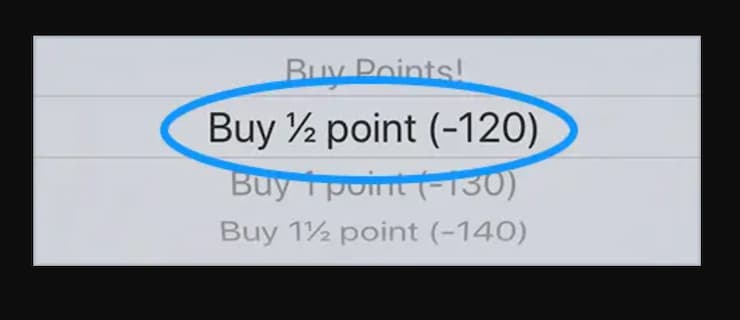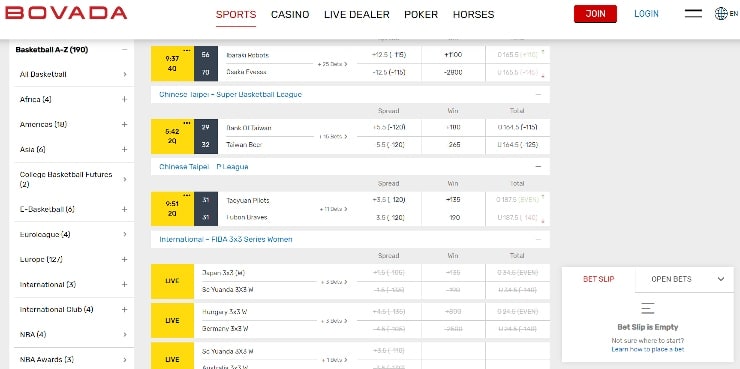Harrison, an experienced copywriter, combines his love for sports and writing at Basketball Insiders. He started his career at the FA (Football Association) writing e-newsletters and web copy for regional governing bodies. Today, he uses his experience and knowledge of the sports betting industry to create in-depth guides, articles, and reviews to help our readers get the most out of their sports betting experiences.
All posts by Harrison BroomNeil is a gambling industry veteran with over 15 years experience as a content writer, editor and speaker at events. He has a Masters degree in English Literature and Philosophy and has combined this analytical inquisitiveness with a passion for sports betting and casino gaming. Neil started his career with Bettingpro.com and helped build not only that site but various others such as LiveTennis.com, LiveDarts.com and numerous other sports informational sites, including GG.co.uk and RacingTips.com He then made the transition to the North American market, working both in the UK and in New Jersey to launch various sports betting and casino sites, including AmericanBettingExperts and NewAmericanCasinos. Working with regulators, Neil has helped to review sports betting sites and also test the regulated betting apps in a professional capacity. He now works almost exclusively in the US market and is one of the main reviewers and fact checkers on SportsLens gambling content. He also speaks at various gambling conferences including ICE, iGB Live and SBC Americas and has contributed to GamblingInsider, EGR Magazine and a number of others in a consulting capacity.
All posts by Neil RoartyBuying points involves adjusting the point spread in your favor by paying an extra fee to the sportsbook. Essentially, this strategy involves decreasing the odds on a spread bet but increasing the probability of the bet being a winner.
For example, let’s say a bookmaker sets a spread for an NBA game -10 for the favored team and +10 for the underdog with odds of -110 for each side of the bet. Should you want to bet on the favorite, buying points allows you to move the line lower to say -9.5 or -9, -8.5, etc. Should you want to bet on the underdog buying points would increase the line to +10.5 or +11 for example

When you move the line the odds will become shorter so if you buy 1 point for either side of the bet, the odds may increase to -130. The more points you buy the lower your potential payout, however, the probability of the bet being a winner increases as it’s easier for teams to cover the spread.
- Show full guideShow less
An Example of Buying Points in Sports Betting
To help you better understand the answer to “what does buying points mean in sports betting,” let’s take a look at a quick example. Suppose you plan to bet on the NFL, and you find the Buffalo Bills favored by 5 points against the Miami Dolphins. If you believe the Buffalo Bills are likely to emerge victorious but lack confidence in the point spread, you have the option to buy a half point (or more, if desired) and bet on the Buffalo Bills at -4.5.
While this bet would incur a higher cost, purchasing a half point enables you to cover the spread if the Buffalo Bills win by five or more – a result that would have led to a push otherwise. You could also do the same for underdogs. For example, you could buy half a point to take the Miami Dolphins from +5 to +5.5, and then you would win the bet if they win outright or lose by five points or less. However, since the point spread has been altered in your favor, the odds will also change, resulting in a lower payout.
Source: BetOnline.com How Does a Bettor Buy Points from a Sportsbook?
To buy points from a sportsbook, simply select the bet you wish to make and choose the option to adjust the point spread. Typically, sportsbooks will charge an increased fee, known as the “juice” or “vig,” for every half-point or full point you wish to buy. The increased cost reflects the improved chances of winning your bet by altering the original odds in your favor.
In popular point spread betting sports like football and basketball, it typically costs around 10 cents worth of juice for every half point. Consequently, buying half a point on a standard bet of -110 would alter the odds to -120, and a full point would result in odds at -130.
It’s important to note that buying in or off of the frequently occurring three and seven point spreads in sports like football can be more expensive. A common industry standard is approximately 25 cents per half point surrounding the +3 or -3 mark and 15 cents for one at +7 or -7.
How Many Points Can You Buy?
The number of points you can buy varies depending on the sportsbook and the specific sporting event. Generally, most sportsbooks allow you to buy up to 3 points on point spreads. However, some sportsbooks may allow more or fewer points to be purchased. As a general rule, the more points you buy, the more you will increase the juice or vig, resulting in lower potential payouts.
What is a Half Point?
You might wonder why half points come into play in betting methods like point spreads, given that sports like basketball and football only involve full points. However, these fractional adjustments are for betting purposes and are used to edit the point spread. If you’re not happy with the point spread set by the sportsbook, you can adjust the margin of victory by 0.5 points, thereby creating more favorable betting conditions.
Source: Bovada.com For example, if a team is favored to win by 3 points in a point spread, you can buy a half point to change the spread to 3.5 points. This small adjustment can have a significant impact on the outcome of the bet, as it may eliminate the possibility of a push or increase the likelihood of a winning outcome. Essentially, half points are used as a tool to customize your wagers.
Buying Points vs. Selling Points
While buying points means paying extra to adjust the point spread or total in your favor, selling points is the opposite strategy. Selling points involves giving up points in exchange for better odds or a lower fee, thus increasing the potential payout of your bet. This strategy can be useful for bettors who are confident that their chosen team will outperform the original point spread or total by a significant margin.
How Can Buying Points Avoid a Push?
Buying half points is a great way to eliminate the possibility of a push, which occurs when a game or event concludes with a final result that precisely matches the point spread set by the bookmaker. In such cases, neither the bettor nor the bookmaker is a winner or loser, and the bet is deemed a tie.
When a push happens, the stake or wager is typically refunded to the bettor, ensuring no money is won or lost on that specific bet. For instance, if the Chicago Bulls are a -7 point favorite and secure a win by precisely 7 points, this results in a push bet, and your initial wager will be returned. However, by purchasing a half point to shift the spread from -7 to -7.5, you can eliminate the possibility of a push, and you would win the bet if the Chicago Bulls win by 7 points or more.
Source: Bovada.com Does Buying Points Work the Same for Every Sport?
Buying points is a common practice across various sports, but the way it works may differ slightly depending on the sport. Below, we’ll take a closer look at buying points in various sports, showcasing the differences and similarities between them.
NFL
When betting on the NFL, buying points is often used for point spread and totals bets. The most common point spreads bettors buy points around are 3 and 7, as these are frequent margins of victory. Due to their significance, purchasing points around these spreads may be more expensive. For example, buying a half point on a -3 spread could cost an extra 25 cents of juice.
NBA
In NBA betting and basketball betting in general, bettors may buy points for point spread and totals bets as well. Here, the key numbers to consider are less significant than in football, and the cost of buying points might be more consistent. For example, a bettor may pay an extra 10 cents of juice for each half-point purchased.
MLB
In MLB betting, buying points isn’t as prevalent as in football and basketball, as baseball betting relies more on moneyline bets. However, for run line and totals bets, bettors may still choose to buy points, usually paying an extra fee for each half-point or full point purchased.
NHL
Similar to baseball, hockey betting primarily focuses on moneyline bets, making point buying less common. Yet, for puck line and totals bets, buying points is an option. As with other sports, bettors will pay an increased juice for each half-point or full point purchased to adjust the betting line in their favor.
Soccer
In soccer, bettors can buy points for point spread (Asian handicap) and totals (over/under) bets. Since soccer games often have lower-scoring outcomes, each half-point adjustment can have a more significant impact on the odds. Consequently, the cost of buying points in soccer may be higher than in high-scoring sports like basketball.
Tips For Buying and Selling Points
Only knowing the answer to “what does buying points mean in sports betting” isn’t enough to be successful. To help you maximize your chances of success, you should also consider the following tips:
- Analyze the key numbers: In sports like football and basketball, certain point margins occur more frequently. In football, these key numbers are 3, 7, and 10, while in basketball, they are 2, 3, and 7. When buying or selling points, try to focus on these key numbers to maximize your chances of a winning outcome.
- Evaluate the cost: When buying points, you often need to pay an additional fee, called “juice” or “vig.” This fee increases with each half-point purchased. Ensure that the potential gain from buying points outweighs the increased cost of the bet.
- Understand the sport and the teams: Familiarize yourself with the sports and teams you’re betting on to make informed decisions. Consider factors such as team performance, injuries, and recent form when deciding whether to buy or sell points.
- Be cautious when selling points: Selling points can be riskier, as it can increase the likelihood of a losing bet. Because of this, bet responsibly and ensure that you have a strong reason to believe that the team you’re betting on will outperform the adjusted point spread before selling points.
FAQs
What does buying points mean in sports betting?
In sports betting, a point refers to a unit of measurement used to represent the margin of victory or defeat between two teams. The point spread is the predicted difference in the final score, while the total (or over/under) is the combined score of both teams.
How do you buy points on the spread?
To buy points on the spread, select your desired bet and choose the option to adjust the point spread. Most sportsbooks will charge an increased fee for each half-point or full point you buy, which reflects the improved odds you’re getting.
How do you make money on the spread?
To make money on the spread, you need to correctly predict whether the favored team will win by more than the point spread or if the underdog team will lose by less than the point spread (or win outright). If your prediction is correct, your bet will win, and you’ll get a payout based on the odds and the amount wagered. Buying points can increase your chances of success by adjusting the point spread in your favor, but it also increases the cost of the bet.
Harrison, an experienced copywriter, combines his love for sports and writing at Basketball Insiders. He started his career at the FA (Football Association) writing e-newsletters and web copy for regional governing bodies. Today, he uses his experience and knowledge of the sports betting industry to create in-depth guides, articles, and reviews to help our readers get the most out of their sports betting experiences.
All posts by Harrison BroomHarrison, an experienced copywriter, combines his love for sports and writing at Basketball Insiders. He started his career at the FA (Football Association) writing e-newsletters and web copy for regional governing bodies. Today, he uses his experience and knowledge of the sports betting industry to create in-depth guides, articles, and reviews to help our readers get the most out of their sports betting experiences.
All posts by Harrison Broom


